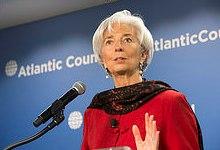
Typical street scene in Santa Ana, El Salvador. (Photo: iStock)
IMF Survey : Lagarde: Prevent “New Mediocre” From Becoming “New Reality”
April 9, 2015
- Global recovery continues, but it is moderate and uneven
- Boosting growth requires more effective demand policies, structural reforms
- International cooperation critical to future growth and development
To prevent a period of protracted low growth from taking hold, policymakers should work together to pick up the pace of the recovery and create more growth now and in the future, IMF Managing Director Christine Lagarde said in a speech at the Atlantic Council on April 9.

Lagarde: “The challenge for policymakers around the world is to combine the policies needed to boost today’s growth with those fortifying tomorrow’s prospects” (IMF photo)
IMF-World Bank Spring Meetings
“Six months ago, I warned about the risk of a ‘new mediocre’—low growth for a long time, Lagarde pointed out. “Today, we must prevent that new mediocre from becoming the ‘new reality’.”
Lagarde, speaking ahead of the IMF-World Bank Spring Meetings that take place April 17-19 in Washington, observed that since the Annual Meetings last October, the global economy has benefited from lower oil prices and by the strong performance of the world’s largest economy, the United States. “So the global recovery continues, but it is moderate and uneven.”
“The challenge for policymakers around the world is to combine the policies needed to boost today’s growth with those fortifying tomorrow’s prospects,” she noted.
The Managing Director stressed that, while global growth is not bad—at 3.4 percent last year it is roughly the average for the last three decades—it is “just not good enough.” She urged policymakers to press ahead with needed reforms.
Quoting John F. Kennedy on the risks of inaction, Lagarde warned that “comfortable inaction is what must be avoided.”
Lifting growth today
Lagarde said that growth remains moderate—roughly the same as last year. Advanced economies are doing a bit better than last year and prospects in the euro area are improving. But forecasts for most emerging and developing economies are a bit worse than last year, mainly owing to lower commodity prices. However, Lagarde pointed out that “there is tremendous diversity within this group.”
With overall growth moderate, the global economy continues to face significant challenges:
Macroeconomic risks. The risk of low growth-low inflation, and high debt-high unemployment persists for a number of advanced economies. These countries should use demand policies to lift today’s growth. Continued monetary accommodation is needed—especially in the euro area and Japan—and fiscal policy should be better calibrated to the strength of the recovery.
Financial risks. Risks to global financial stability are rising and they are also migrating—for example, from banks to nonbanks and from advanced economies more toward emerging markets. To address these risks, at the global level, this means ensuring market liquidity during times of stress, improving macro- and micro-prudential policies for nonbanks, and following through on the regulatory reform agenda. At the country level, it means limiting excessive risk-taking and managing existing vulnerabilities.
Stronger growth tomorrow
Lagarde noted that in both advanced and emerging economies, potential growth is being pared down, largely reflecting lasting scars from the financial crisis. This means that “structural reforms need to go hand-in-hand with macroeconomic and financial policies to raise confidence and generate investment.”
While some structural reforms take longer to bear fruit, others have a more immediate effect on demand. “Our own research shows that boosting efficient infrastructure investment can be a powerful impetus to growth both in the short run and in the long run,” Lagarde noted.
Lagarde also pointed to recent IMF research, which fleshes out priorities and payoffs in the areas of productivity growth, labor force participation, and trade.
â— First, reversing the decline in productivity growth in advanced economies requires lowering barriers to entry in product and services markets.
â— Second, removing barriers to labor force participation is key to tackling inequality and ensuring broad-based growth.
â— Third, there are potentially huge global gains from further trade reform and integration.
Working together
Lagarde stressed the need for an open and resilient multilateral system that can leverage national benefits and help avoid inconsistencies that can generate negative spillovers.
Emerging and developing countries must have greater weight and voice in global economic institutions—to reflect the new reality of their contributions and responsibilities regarding the global economy. Lagarde called on the U.S. Congress to ratify the IMF’s 2010 quota and governance reforms so that these measures can become effective.
Another reform to strengthen the resilience of the international monetary system, Lagarde said, would be to increase the role of the IMF’s Special Drawing Rights as a global reserve asset and facilitate the integration of dynamic emerging markets into the global economy.
Lagarde also stressed the importance of strengthening the international development system. She highlighted three critical issues on the agenda—financing for development, the new “sustainable development goals” or SDGs, and climate change—and pointed out that the IMF is a committed partner in this effort. The Fund can contribute by working in areas such as financing, policy advice and analysis, and capacity building and technical assistance.
“Here, 2015 presents a special moment: an opportunity to make a tangible difference in the lives of a large number of people in the world—especially the poorest people,” Lagarde noted.


